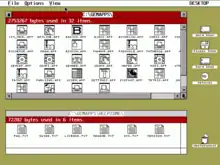 OpenGEM showing hard disk and CD-ROM icons (to the right) | |
| Developer(s) | Caldera Thin Clients |
|---|---|
| Initial release | 1999 |
| Operating system | DOS |
| Available in | English |
| Type | Windowing system |
| License | GPL-2.0-only |
FreeGEM released in 1999 is a windowing system based on Digital Research's GEM which was first released in 1985.[1] GEM stands for "Graphics Environment Manager".
Overview
FreeGEM is the free software/open source version of GEM developed after Caldera Thin Clients released the GEM code under the terms of the GNU GPL-2.0-only free software license in April 1999.[2] Caldera Thin Clients owned the source code to GEM through Caldera's purchase of the remaining Digital Research assets from Novell on 23 July 1996,[3] who had acquired Digital Research in June 1991.[4][5]
FreeGEM code works on almost every version of DOS, and runs on almost every IBM compatible PC. One can download all the FreeGEM binaries and source code in one package through the OpenGEM SDK. The OpenGEM SDK also contains language bindings, documentation, and compilers. There are additional FreeGEM resources available through John C. Elliott's GEM website.
OpenGEM is a popular FreeGEM distribution. Other distributions include Owen's FreeGEM Distribution.
OpenGEM
OpenGEM is a non-multitasking 16-bit graphical user interface (GUI) for DOS. It is an extended distribution of FreeGEM that includes features of the original Digital Research GEM.
OpenGEM is intended to provide a simple to install and use GUI system and windowing framework for the FreeDOS operating system.
Caldera Thin Clients (later known as Lineo), who owned the source code to GEM through Caldera's purchase of the remaining Digital Research assets from Novell on 23 July 1996,[3] released the source to GEM under the terms of GPL-2.0-only in April 1999.[2] OpenGEM was developed by Shane Martin Coughlan in collaboration with the FreeGEM Developer team, and is free software released under the terms of the GPL-2.0-only. OpenGEM versions 3 through 6 are hosted on SourceForge and on the FreeDOS website.
OpenGEM has not been actively developed since 2008 but is feature-complete as a basic GUI and includes a full SDK for future third-party development or extension.
Compatibility
OpenGEM works with FreeDOS Beta 9 and above, DR DOS 5.0 and above, MS-DOS 3.3 and above, PC DOS 3.3 and above, REAL/32, and DOSBox 0.65. OpenGEM will function on Windows 95, Windows 98, Windows 98SE, and Windows ME. It is not known to work with Windows NT, Windows 2000 and Windows XP or later.
See also
References
- ↑ Roger (2003-09-25). "GEM OS: The Other Windows". PCMech. Archived from the original on 2008-01-19.
Today GEM continues to be developed as FreeGEM
- 1 2 Jemmett, Ben A. L. (April 1999). "Caldera releases GEM under the GPL". Deltasoft - GEM News. Archived from the original on 2016-11-07. Retrieved 2016-11-07.
Caldera Thin Clients, Inc. released the source code for GEM and ViewMAX under the GNU Public License in mid April, following years of speculation over GEM's future. Caldera bought the GEM sources from Novell along with the DR-DOS in 1996, at the time noting that they may develop GEM into a platform for mobile computers and thin clients. However, these plans were dropped, and GEM was instead released into the open-source community.
- 1 2 Leon, Mark (1996-07-29). "Caldera reopens 'settled' suit, buys DR DOS — Antitrust suit against Microsoft". InfoWorld. News. Vol. 18, no. 31. InfoWorld Publishing Co. p. 3. ISSN 0199-6649. Archived from the original on 2020-02-08. Retrieved 2020-02-08. ; Leon, Mark (1996-07-29). "Caldera reopens 'settled' suit, buys DR DOS — Microsoft's response: lawsuit is 'ironic and sad'". Computerworld New Zealand. IDG Communications. ISSN 0113-1494. CMPWNZ. Archived from the original on 2018-08-23. Retrieved 2018-02-13.
- ↑ Scott, Karyl (1991-07-29). "Novell/DRI merger to reap better client management". InfoWorld. Networking. Vol. 13, no. 30. InfoWorld Publishing Co. p. 33. ISSN 0199-6649. Archived from the original on 2020-02-09. Retrieved 2017-01-21.
- ↑ "Novell and Digital Research sign definitive merger agreement". Business Wire. 1991-07-17. Archived from the original on 2018-08-18. Retrieved 2017-01-24.